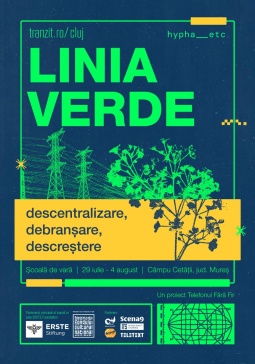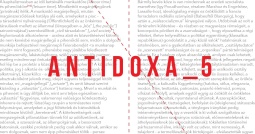Reading Evald Ilyenkov

Friday, 22th of November 2024
tranzit. ro/Cluj,
Napoca str, no 16, 1st floor, Cluj Napoca
Evald Ilyenkov (1924-1979) is the most important Soviet Marxist philosopher of the postwar. He has written on a large gamut of subjects, from problems of theoretical philosophy, theory of knowledge, the concepts of the “abstract” and the “concrete”, the “ideal”, and the universal, to Marx’s materialist dialectical method in Capital, problems of cybernetics, automation, machine-thinking, to problems of pedagogy, theory of education, psychology, human mind, and ethics and aesthetics. Ilyenkov can be considered the philosophical originator of what is known as “activity theory” in the Soviet Union, which in its turn precedes what is known as Cultural-Historical Activity Theory internationally nowadays. The concepts, ideas and theories of Ilyenkov have influenced generations of younger philosophers from the 1950s to present in Eastern Europe, while recently enjoying an increased attention in the anglophone world.
The aim of these monthly reading seminars is to closely familiarize the participants with the key concepts and theories developed by Ilyenkov with the hope of utilizing them in the face of contemporary polycrisis.
read more /
POLYCRISES ACROSS DIVIDES

29 - 31 August 2024
Historical Materialism Cluj/Kolozsvár 2024
The first edition of Historical Materialism Cluj/Kolozsvár will take place between 29-31of August 2024, in Cluj-Napoca:
https://hmcluj2024.conference.ubbcluj.ro/
Open call for participation
1st of February - 1st of April 2024
The conference is organized by the Babeș-Bolyai University in partnership with Historical Materialism: Research in Critical Marxist Theory and tranzit.ro/Cluj.
read more /
Marxism & Ecology Summer School
CALL FOR PARTICIPATION now open until the 15th of May /

Câmpu Cetății, Mureș County, Romania
𝐓𝐡𝐮𝐫𝐬𝐝𝐚𝐲 𝟐𝟐𝐧𝐝 𝐀𝐮𝐠𝐮𝐬𝐭 𝐭𝐨 𝐓𝐡𝐮𝐫𝐬𝐝𝐚𝐲 𝟐𝟗𝐭𝐡 𝐀𝐮𝐠𝐮𝐬𝐭 𝟐𝟎𝟐𝟒
With 𝐓𝐫𝐨𝐲 𝐕𝐞𝐭𝐭𝐞𝐬𝐞, 𝐊𝐚𝐭𝐡𝐚𝐫𝐢𝐧𝐚 𝐇𝐮𝐧𝐟𝐞𝐥𝐝, 𝐀𝐭𝐭𝐢𝐥𝐚 𝐒𝐳𝐢𝐠𝐞𝐭𝐢 and 𝐠𝐮𝐞𝐬𝐭𝐬
Call for Participants open until the 𝟏𝟓𝐭𝐡 𝐨𝐟 𝐌𝐚𝐲 𝟐𝟎𝟐𝟒.
It is easy to grow numb to the litany of environmental devastation in recent years. The SARS-CoV-2 pandemic killed thirty million people; atmospheric CO2 stands fifty per cent higher than two centuries ago (currently 423.6 ppm); wildfires rage in Chile and Argentina, while 11,300 people were killed by an overnight flood in Derna; less than a tenth of the world’s plastic is recycled; over 75 billion livestock animals are killed every year; the number of coastal ‘dead zones’ increased from 10 in 1960 to 415 in 2023; the US government declared twenty-one species formerly found in its territory extinct in 2023. One can go on, and on, and on.
At the same time, the last thirty years has seen the development of sophisticated radical critiques of environmental degradation and the ‘capitalocene’, the need for struggle to achieve transformation in response to the continued failure of centrists to achieve meaningful reform.
read more /
Summer school: GREEN LINE: decentralisation, decoupling, degrowth

CALL for PARTICIPATION
open until the 30th of June 2024.
The summer school take place in the period:
29 July - 4 August 2024
hypha_etc, Câmpu Cetății, Mures county
The Green Line Summer School is aimed at students interested in the video essay as a form of argumentation and communication on the one hand, and the green transition as a subject on the other. The school is open to students regardless of field of study and previous experience.
We expect students from both STEM and socio-humanities backgrounds, as well as high school seniors, to attend the school. There is no registration fee. We offer free accommodation in 4-6 bedded rooms, up to a maximum of 24 beds, plus free camping space. Travel expenses (train or bus) can be covered up to 130 RON.
Those wishing to participate are asked to send a letter of motivation by 30 June to telefonulfarafir2023@gmail.com.
read more /
ANTIDOXA_7 – Reading group GMT

13 May2024, 6 p.m
tranzit. ro/Cluj, Napoca str, no 16, 1st floor, Cluj Napoca
[The event is held in Hungarian]
„The desirable goal of politics can be defined in philosophical terms by reflecting on what is Evil, the root cause of human suffering.” (New Eastern European Left)
„Hippies, punks, antifas.
Feather merchants and shirkers.
Niggers. Lesbians. Anarchists. Jewish commies.” (Dawn contemplation on communism and more)
There are many opinions about the thinking of Gáspár Miklós Tamás. Is there a political truth to be gleaned from his writings that goes beyond opinions? Once a month, we read a text from Gáspár Miklós Tamás' book „Antitézis” together, interpret it, discuss and debate it.
On the 13th of May, we will discuss "On solidarity". This time the discussion is led by Erőss Réka.
read more /
REVISITING STATE SOCIALISM VIII

Thursday, 11th of April, 2024, 7 p.m
"Lucian Blaga" University Library from Sibiu/ Str. Lucian Blaga, no. 2A
tranzit. ro/Cluj in partnership with Babes Bolyai University Cluj-Napoca and "Lucian Blaga" University Library from Sibiu invites you to a lecture and discussion within the project
"Philosophy in Late Socialist Europe: Theoretical Practices in the Face of Polycrisis" on the topic of the polycrisis of the 1970s -1980 with the title
„Reframing Sovereign Power in Late Socialist Romania: Crisis, Militarism and the Nationalist Turn”.
The meeting is moderated by Ștefan Baghiu.
read more /
REVISITING STATE SOCIALISM VII

March 28, 2024, 7 pm
tranzit. ro/Cluj, 16 Napoca str., Cluj-Napoca
We invite you to join our series of conferences at tranzit.ro/Cluj partnered by Babeș-Bolyai University in Cluj under the project Philosophy in Late Socialist Europe: Theoretical Practices in the Face of Polycrisis.
The seventh meeting is chaired by Siyaves Azeri.
Una Blagojević
„Post-War ‘Crisis of Marxism’: Insights from Yugoslav Marxist Revisionists”
In my talk, I discuss the ‘crisis of Marxism’ and ‘crisis of socialism’ by looking at the example of Yugoslav Marxist Revisionists. Their discourses of crisis encompassed debates on the crisis of epistemology, the crisis of subjectivity, and the crisis of philosophy taking place in Western European intellectual circles. The disorientation and atomization of the human being—phenomena they adopted and adjusted from the analysis of Western technological societies—inevitably led to a disintegration of Yugoslav society, alongside the latent growth of ethnonational affirmations in the early 1970s. I point out how their conceptual framework of crisis facilitated the adoption of integral ethnonationalist philosophical and political positions.
read more /
ANTIDOXA_6 – Reading Group GMT

18th of march 023, 6 p.m
Address:tranzit. ro/Cluj,
Napoca str, no 16, 1st floor, Cluj Napoca
[The event is held in Hungarian]
On the 18th of March, we will discuss two sections of „Truth and Class”, entitled „People, estate and class” and „The truth about class, or class and truth”.
This time the discussion is led by Erőss Réka and Bíró Noémi.
read more /
Revisiting State Socialism VI. Dance music as a metaphor for socialist acceleration in Romania in the 1960s and 1980s.

On 15 March, at 19:00, the sixth edition of the project "Revisiting State Socialism" took place with the title "Dance music as a metaphor for socialist acceleration in Romania in the 60s and 80s". The guests were Paul Breazu and Mihai Lukács, and the meeting was moderated by Ștefan Baghiu.
Socialist time was perceived in the late 1960s as accelerated, no longer corresponding to a linear flow, the sound of factory production being associated with new music that was beginning to incorporate electronic sound. In the following decades, Romanian pop, light and electronic music grew in parallel with the new industrialization and development at speed, becoming a soundtrack of the new material conditions of late socialism. Romanian pop ("light") music branched out in new directions in the early 1970s, and its social character gained momentum for creators and the general public. Composer and music historian Laurențiu Profeta noted in 1976 the emergence of militant light music songs in the later years, many of which became slams, reaching a much wider audience. Seen as a result of the party's ideological programme, which left no artistic sector untouched, social-political light music songs became imposed themselves authoritatively. Socialism was not just an economic project, but a complex that encompassed political, social, cultural and artistic dimensions, so the systemic projection onto a pop sub-genre like dance music was not left to chance.
read more /
András Vigvári: Zártkert-Magyarország
Book Launch in Cluj Napoca /

Thursday, 29th of February, 6 p.m.
Address: tranzit.ro/Cluj, Napoca str, no 16, 1st floor, Cluj Napoca
How do people address the housing crisis? András Vigvári's book deals with the grassroots responses to the housing crisis in Central and Eastern Europe, focusing on the settlement of suburban private agricultural areas. The book presents an ethnographic study of the settlement of a suburban garden area on the outskirts of a town near Budapest, once an agricultural and weekend housing area, and discusses the results of the fieldwork as part of global social and housing processes.
read more /
ANTIDOXA_5 – Reading group GMT

26th of February2024, 6 p.m
Address:tranzit. ro/Cluj,
Napoca str, no 16, 1st floor, Cluj Napoca
[The event is held in Hungarian]
„The desirable goal of politics can be defined in philosophical terms by reflecting on what is Evil, the root cause of human suffering.” (New Eastern European Left)
„Hippies, punks, antifas.
Feather merchants and shirkers.
Niggers. Lesbians. Anarchists. Jewish commies.”
(Dawn contemplation on communism and more)
There are many opinions about the thinking of Gáspár Miklós Tamás. Is there a political truth to be gleaned from his writings that goes beyond opinions? Once a month, we read a text from Gáspár Miklós Tamás' book „Antitézis” together, interpret it, discuss and debate it.
On the 26th of February, we will discuss a section of the text „Truth and Class”, entitled „Two kinds of socialism.”
read more /
Revisiting State Socialism (V)

February 22th in Bucharest, 7 p.m
Grădina ArtHub,
General Constantin Budișteanu Street, no 10
We invite you to join our series of conferences by tranzit.ro/Cluj and Babeș-Bolyai University in Cluj under the PNRR project Philosophy in Late Socialist Europe: Theoretical Practices in the Face of Polycrisis.
Our Bucharest meeting is moderated by Adela Hîncu.
Our podcast series here:
https://soundcloud.com/rev-state-socialism
Our HMCluj 2024 conference here:
https://hmcluj2024.conference.ubbcluj.ro/
Socialism, Alternative Globalization, and Human Rights
talk by Raluca Grosescu & Bogdan Iacob
State socialism had a crucial role in post-war globalization and the subsequent crafting of international law. During the Cold War, Eastern Europe produced trans-regional circulations, epistemic networks, and institutional projects alternative to but interconnected with those generated in the West. Decolonization was the catalyst for socialist globalism in international organizations, at the level of inter-governmental relations and in terms of reconceptualizing norms and hierarchies.
read more /
